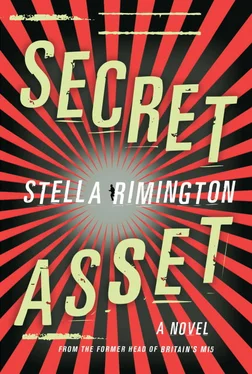It was a seventeenth-century foundation with medieval bits, according to Peggy, who had swotted up diligently the day before. More obscure than its namesake in Cambridge, it nonetheless numbered among its distinguished alumni the writer Thomas Browne, Samuel Johnson, and more recently Michael Heseltine.
They were directed by a porter through an old quad, with a small square of tended lawn. On the far wall, window boxes were filled with early geraniums. They walked on into another quad and there against the wall of the older part of the College sat a small statue of a woman, hands folded in prayer or lament. Not a good omen, thought Liz, thinking of the impending interview. She was not conventionally religious, and wondered a little nervously what role theology was going to play in the conversation.
Chaplain Hickson turned out to be an enormous man, with a vast beer belly and a thick curly beard, more Friar Tuck than the ascetic theologian Liz had expected. A Northerner, he was jolly and startlingly impious, greeting Liz and Peggy effusively before offering them coffee or—“since the sun is over the yardarm in France”—a glass of sherry.
Both Liz and Peggy opted for coffee, and perching on a pair of uncomfortable chairs, held stained mugs of Nescafé while the chaplain hunted high and low for some biscuits. Only when he found them, after several minutes’ searching, did their interview begin. He sat down with a happy thump on the sofa, putting a plateful of chocolate digestives within easy reach. By this time Liz had formed the distinct impression that for Chaplain Hickson, material sustenance was more important than prayer.
Liz began by explaining their visit was strictly a formality, to update the original vetting. She had worried, back in London, whether a man of the cloth would be willing to speak freely about a former student’s personal life, particularly as it was the morally dubious aspects of that life she most needed to know about. But the chaplain was happy to talk about the young Patrick Dobson.
“He took things very seriously and he worked extremely hard. Nothing wrong with that,” he added with a rolling laugh that suggested there was. “But it did distance him a bit from some of the others. There was something almost middle-aged about the boy.”
“Nothing wild about him then?” said Liz with a faint smile.
“Certainly not. On every count, he was a model citizen.” He grabbed a biscuit from the plate. “He joined the Young Conservatives, ate all his suppers in Hall, and avoided temptation. There were no women in his life—not, I should add, because of disinclination on his part. It’s just that he was hardly irresistible to the fairer sex. Funny how that seems to happen, isn’t it?”
“How did you come to know him so well?” Liz asked, a little taken aback by this very personal portrait.
“He came to chapel a lot. Every week, sometimes on Wednesday.” He grimaced slightly. “It may sound odd coming from me, but I found him a little too religious, if you know what I mean. Pretty uncommon among lads that age, especially at Oxford.”
“Did he confide in you?”
For the first time the chaplain looked startled. “ Me ? Oh no. You see, there was something of a class divide between us.”
“Really?” asked Liz. If she remembered rightly, Dobson’s background was anything but patrician. Or was Hickson suggesting his own was? Looking at this biscuit-loving mountain of a man, she found it hard to believe.
“You see, young Patrick came from a working-class family. By dint of his admittedly healthy-sized brain he managed to win a scholarship to an independent school. There, he developed not only his mind, but”—the chaplain waved a finger, and Liz could see he was starting to enjoy himself—“a precocious sense of social advancement.”
“I see,” said Liz, masking her amusement.
“At Oxford these aspirations continued. He liked to wear a jumper most days,” Hickson continued, almost joyfully stressing the word’s initial “j,” “and sometimes even sported his old school tie. On Sundays, you would see him wearing a checked tweed suit which, he once told someone, was of the sort worn by ‘gentlemen in the country.’” Hickson looked at Liz with a twinkle in his eye. “You can imagine how much his fellow students loved that.”
“Was that the class difference you mentioned?” asked Peggy, who had stayed silent until now. She looked puzzled.
“Oh, there was no difference to begin with. We were both common as muck,” the chaplain said with a generous grin. “The thing is, I still am. I’m amazed they have me here. I suppose it’s a form of political correctness.” And this time he gave such a laugh that it shook the sofa.
Leaving a few minutes later, after declining another offer of sherry, Liz wondered whether the chaplain’s mocking portrait of Dobson provided real grounds for concern. Clearly Dobson had been an earnest, slightly geeky undergraduate, so intent on erasing the traces of his humble origins that, paradoxically, it made him stand out rather than fit in. Liz was uneasy about someone who had invented a persona for himself—checked tweed suit indeed—since if they could base their life on a lie, what would keep them from basing it on more than one?
At the same time, Liz found herself almost sorry for someone so obviously unsure of himself, amused as she had been by the chaplain’s satirical account. After all, she thought, remembering the unhappiness of her teenage years, if being a social misfit in late adolescence was grounds for suspicion, Liz would be a prime suspect in her own investigation.
They’d moved on to Somerville College, where they found Judith Spratt’s old tutor, an elegant bluestocking named Isabella Prideaux, who must have been near retirement age. In her ground-floor room, with French doors overlooking the enormous quad, Isabella gave a brief and laudatory account of Judith’s time as an undergraduate. She seemed to know where her ex-pupil had ended up. “She keeps in touch,” she said, adding proudly, “but then, most of my students do.”
They had met at twelve-thirty. After half an hour the ground had been covered, and Liz started to make her excuses, thinking that she and Peggy would go and find a sandwich somewhere. So it came as a small embarrassment when it became clear they were expected to stay for lunch. Peggy looked quizzically at Liz, but there seemed no polite way out, and they trooped to a small dining room near the larger hall.
Here conversation about Judith Spratt was not on the menu, since they sat surrounded by Fellows of the College. Most of them seemed to be men—somewhat to Liz’s surprise, since her view of Somerville had been formed by Dorothy Sayers’s Gaudy Night . After a lengthy disquisition from a Physics lecturer seated next to her about the beauty of quarks, Liz was glad to escape with her host and Peggy for coffee to the Fellows’ Common Room, where they managed to occupy a quiet corner by themselves. “I’m sorry about Professor Burrell,” Miss Prideaux said to Liz, who realised she must mean her lunch partner. “When I listen to him he might as well be speaking in Urdu.”
They chatted on for a while, then, just as Liz and Peggy were about to go, Miss Prideaux suddenly said out of the blue, “I was awfully sorry to hear about Ravi.”
Liz’s ears pricked up now. “Yes?” she said.
“I know it sounds old-fashioned, but I do think these inter-racial alliances are always more fragile.” When Liz didn’t say anything, Miss Prideaux flushed slightly, perhaps worried that she sounded racist or indiscreet, or both. She made a show of looking at her watch. “Goodness me, here I am gossiping, and I’ve got a finalist in hysterics about her Anglo-Saxon paper waiting for me.”
Читать дальше












